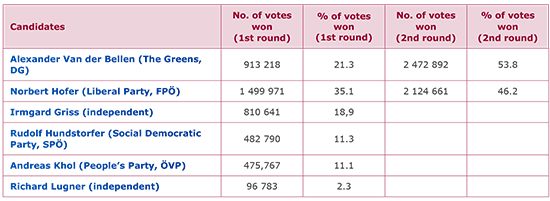Results
Elections in Europe
Corinne Deloy
-

Available versions :
EN

Corinne Deloy
Alexander Van der Bellen won the second round of the presidential election in Austria on 4th December. The ecologist candidate (Greens, DG) who was standing as an independent won 53.8% of the vote against 46.2% of the vote which went to his rival, populist candidate Norbert Hofer (Liberal Party, FPÖ). Turnout totalled 64.6%, i.e. -8.10 points in comparison with the previous (invalidated) election on 22nd May last.
This "third" round on 4th December was organised after the invalidation of the second round on 22nd May 2016 in which Alexander van der Bellen won, just drawing ahead of Norbert Hofer with 30,863 votes. The latter challenged the results. On July 1st, after having interviewed 90 people for two weeks, the Constitutional Court cancelled the second round indicating that although there was no proof of any electoral fraud, irregularities had marred this election.
Initially planned for 2nd October the vote was postponed until 4th December due to problems that emerged with the envelopes used for postal votes, the distribution of which to those who wanted to vote this way, had already started.
Results of the Presidential election on 24th April and 4th December 2016 in Austria
Turnout: 68.5% (1st round) and 64.6% (2nd round)

Source: Home Affairs Ministry http://wahl16.bmi.gv.at/
The populist candidate rapidly acknowledged his defeat. "I would like to congratulate Alexander van der Bellen on his success and I call on all Austrians to stand together and work together," declared Norbert Hofer when the results were announced. He also said that "in democracy the electorate was always right". "This time there will be no challenge, we are certain that the citizens' votes have been processed correctly," indicated the FPÖ leader Heinz-Christian Strache.
Aged 72 and from a family which had fled communism, Alexander van der Bellen was born in Vienna. A graduate in economy from the University of Innsbruck, he was assistant at the Finance Institute of this university and then the International Institute for Management and Administration in Berlin. In 1976 he became professor at the University of Innsbruck, then at the Federal Administrative Academy in Vienna, where he subsequently became dean of the faculty of economic and social science.
Firstly a member of the Social Democratic Party, Alexander van der Bellen later joined the Greens (DG). Elected MP in 1994 he then became the party's spokesperson in 1997, a post he occupied until 2008.
He is the first Austrian head of State to come from the Green party but the second ecologist to be elected to the presidency of the Republic of an EU Member State, after Latvian Raimonds Vejonis (Union of Greens and Farmers, ZZS).
He will take office on 26th January next).
The 2016 Presidential election has confirmed that the Proporzsystem, a corporatist system, which forms the heart of the Austrian political landscape, based on compromise and the sharing of power between the two main parties (Social Democratic Party, SPÖ, and the People's Party (ÖVP), likewise the cooperation between unions and employers, has now been exhausted; this explains the sharp rise in support for the FPÖ, the leading party in the polls. These are disturbing factors in view of the upcoming general elections that are planned for the autumn of 2018.
On the same theme
To go further
Elections in Europe
Corinne Deloy
—
25 February 2025
Elections in Europe
Corinne Deloy
—
18 February 2025
Elections in Europe
Corinne Deloy
—
28 January 2025
Elections in Europe
Corinne Deloy
—
14 January 2025

The Letter
Schuman
European news of the week
Unique in its genre, with its 200,000 subscribers and its editions in 6 languages (French, English, German, Spanish, Polish and Ukrainian), it has brought to you, for 15 years, a summary of European news, more needed now than ever
Versions :



